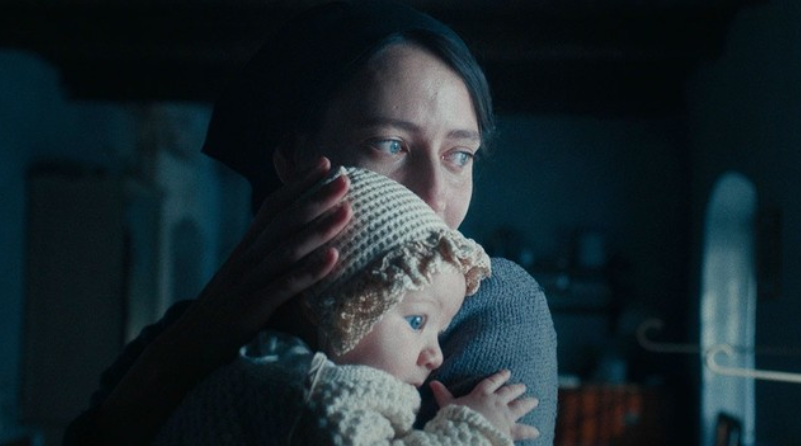Maura Delpero’s Vermiglio uses Vivaldi’s ‘The Four Seasons’ as one of its musical motifs. Cesare (Tommaso Ragno) the patriarch of the large Catholic Grazaidei family spends his money on phonograph records for spiritual and cultural nourishment. His wife, Adele (Roberta Rovelli) who is either pregnant or nursing throughout the film is more concerned with earthy matters such as how they will feed a household which expands to up to eleven souls. In a remote community in the Northern Italian Alps in 1944 the war overhangs the village. Men are gone, some lost forever, some returned to be forever lost in their experiences at the front. Over the period of four seasons Vermiglio the community and the Grazaidei family will be thrust into modernity.
The film begins in winter. The Grazaidei family awakens. Cesare’s eldest daughter, Lucia (Martina Scrinzi) finds warmth by leaning into the cow she is milking for the family. Adele holds her fussing infant son while she ladles out the milk to her children. Angelic twin boys, the young and vibrant Pietrin (Enrico Panizza), eldest son Dino (Patrick Gardner), middle daughter Ada (Rachele Potrich), and the youngest daughter Flavia (Anna Thaler). Delpero’s tableau of simple and harmonic domesticity is deceptive. For already there are seismic shifts within the family dynamics that she will reveal both gradually and with an abrupt urgency.
Cesare is the local maestro – or schoolteacher. He conducts classes for children up to the age of seventeen. His classroom is attended by all the age groups. He teaches his own children except for Lucia and the infant. Vermiglio is unsettled by the appearance of two deserters from the army. His shellshocked nephew, Attilio (Santiago Fondevila) and Pietro (Giuseppe De Domenico) his Sicilian comrade who saved his life by carrying him on his shoulders to the village. They ran from the Nazis and are in hiding. Cesare’s sister Cesária, Attilio’s mother is assisting them both by feeding them. Pietro and Lucia meet and soon they are in love and Pietro becomes a fixture at the Grazaidei family table.
As winter moves into spring there will have been a death but also the promise of new life. The rhythm of the town changes. Flavia who shares a bed with Ada and Lucia is the only child who will be given the opportunity to continue schooling. She watched and interpreted Pietro and Lucia’s winter romance. Ada, who desperately wants to continue her schooling, is discovering her own sexual awakening through self-pleasure and self-punishment (if she masturbates, she throws herself into the chicken coop and eats the droppings). Adele is pregnant again. Dino is fighting with Cesare and drinking. The local ‘black sheep’ Virginia (Carlotta Gamba) has caught both Dino and Ada’s eyes with her short hair and devil-may-care attitude. Vermiglio must decide who it will accept and reject. Within the community is another community – the Grazaidei family. Each member (apart from the twins) is yearning and questioning. From Flavia up they all have secret knowledge and secrets they are hiding.
Lucia marries Pietro, her eyes shining, and her belly already seeded (something Adele notes). A photograph is taken at the wedding feast. In the still image is an entire world on the precipice of monumental change. At the centre of the change are the three sisters who each have paths chosen for them by men, but eventually will chose their own destinies.
In Summer the war ends and soldiers return to Vermiglio. Pietro must report back to Sicily. He gets on a cart equipped with a rifle promising to return to Lucia in time for the birth of their child. Lucia waits and as time passes it appears he will never return. Ada accepts that she will not be chosen for further schooling but finds a new path to education and freedom. Flavia, a child of the future, undergoes puberty and reaches her destination despite wanting to stay for Lucia.
Maura Delpero’s film is a masterpiece of symbolism and specificity, but through its intimacy there is an undeniable universality of experience. Generations nourish and starve each other in equal measure. Ada and Flavia are devoted to Lucia. Cesare doesn’t see all his children with the clarity he needs to, but he’s also not an unbendable patriarch. Adele nurtures but she isn’t unaware of Cesare’s limitations. Attilio with his trauma sees Lucia and they share a silent rapport.
Ada says, “I would like to be a priest… because when you speak people listen to you.” Ada throughout the narrative gave warnings to people but seemed to be cursed like Cassandra. Flavia accidentally told secrets through her homework, but Cesare was more concerned with her intelligent prose than he was with decoding its meaning. Dino consoles Pietrin with local myths and helps him understand death. Collectively the family and the community have pieces of the puzzle knowledge about the mysteries of life, but none of them have a definitive answer and they were each wrong about something. Such is life in any era. Vermiglio is a rich tapestry of human sensibility. It is tender, funny, devastating, and hopeful. A profound cinematic observation.
Director: Maura Delpero
Cast: Martina Scrinzi, Carlotta Gamba, Giuseppe De Dominico
Writer: Maura Delpero

